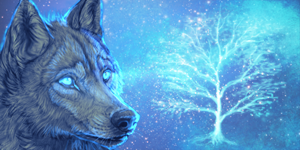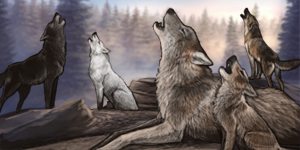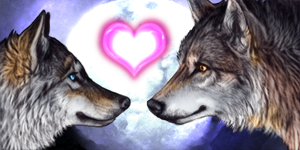Ylfing
My Den
- Eldaskáli are the core of the pack, the scouts, herbalist, mentors, and any retired wolf important to my pack/lore.
- The Veiðiskáli dens are my hunting parties.
- Úlfheðnar: Friendly/Romantic wolves
- Einherjar: Friendly/Romantic wolves
- Odensjakt: Aggressive/Stoic wolves
- Valkyrja: Friendly/Romantic wolves, females only
- Húnskáli houses the pupsitters and pups still in training/that I'm considering keeping
Clan Beliefs
At the core of Ylfing's beliefs is a struggle between order and chaos. They believe the world was created from the corpse of Ymir, a primeval wolf from whom the Jötnar descended, the embodiment of chaos and antithesis of their own creators, the Æsir. Their gods created order from disorder, sustaining and enforcing the cosmos to which they belong. But while they shaped the world with their own aims and ideals, they could not change its inherent nature from the flesh of which it was born. As such, to Ylfing the character of the world around them matches that of the jötnar—mighty, yes, tending towards destruction and disorder. Any wolf who has spent time in the frozen lands where they make their home would not contest this worldview. It cares not for the loyalty of the creatures who continue to try to inhabit it, ambivalent to their survival.
And so, when they struggle against the might of nature, they do not blame the Æsir, but instead look to them for guidance and intervention to create order, to manipulate the world as they did in their best interest. One of the main ways they seek the favor of their gods is through sacrifice, which is the cornerstone of their most important celebration: the spring equinox. Every year a sacrifice is made of a male of every local prey item—including a wolf. While also celebrating autumn, the beginning of summer, and midwinter, the extent of the celebrations—and the sacrifices made—are minor in comparison to spring. They also place a strong value on visions and dreams, which they believe is one manner in which their gods or guides known as fylgjur can communicate and reveal fates.
In Ylfing society, they are known as a clan rather than a pack, and their leader is the chieftain. The chieftain is not viewed as infallible, someone to be blindly followed. While they hold the key decision making power and guide the clan, if they are self-serving in their ambitions the clan will abandon or depose them. A leader without followers is no leader at all, and the wolves of Ylfing have no qualms about seeking better opportunities on their own. That being said, the wolves of Ylfing are anything but disloyal. Their honor and pride mean they want the best for themselves and their clan, and will settle for nothing less. Their ideal image of a chieftain is one who will put themselves at equal stakes as the rest of the clan and whom they would gladly lay down their life for or alongside.
Succession for the title of chieftain is largely a free for all, but that isn't to say it's disorganized. While it is not uncommon for it to follow a lineage, any member of Ylfng is eligible for the role. As previously stated, they believe it is traits and values that make a wolf equipped to lead, not birthright. Typically a successor is prepared for the role before the death of a current chieftain, but challenges can be made and it falls to who the clan chooses to support.
Besides the chieftain, scouts are seen as the most honorable members of society. They must be well rounded in their skills and provide an important service to the clan, bringing back resources from far and wide not only in material forms, but in the form of knowledge through their encounters in environments and with other wolves and packs. Only the best suited are chosen for the role, with the decision largely up to the current scouts as to who they wish to pass their knowledge onto. When a scout's time is nearly up, or when they desire to retire, a pup is chosen very young to begin the important training. Retirement, however, is uncommon, with the role usually maintained for life given the importance of having an experienced scout.
Hunters are the backbone of the clan, without whom they could not survive. Most of the wolves in Ylfing are hunters, but not all are viewed equally. The most successful hunting parties garner the most respect and recognition, creating a healthy competition between them. The hunting parties largely govern themselves with minor oversight of the chieftain. If they find one of their members to be inadequate, it is their decision to remove them. When multiple hunting parties have openings available, the most successful gets first choice on their replacement, taking priority even before the scouts. Familial relationships and lineages are common among the various hunting parties, but not required.
The læknir ("healer"), or herbalist, is a new one for the clan. Traditionally undermined, it is considered a female role, but it is gaining acknowledgement for its importance.
Pupsitters are typically ex-hunters, but occasionally come from other roles that have retired. As all roles are instated for life, it is a wolf's voluntary choice to retire to pupsitting, unless they are forced due to injury. Occasionally a puppy that is not chosen for another role will be given the opportunity to live out its life as a pupsitters if the role is needed.
Mentorship is an exclusive role, with only three allowed in the pack. They may come from any prior role and are chosen based on their skill and experience. Wolves that retire who represent the best in either strength, speed/agility, or wisdom/smarts are chosen as mentors instead of pupsitters. However, they may be retired into a pupsitter role if a new wolf retires who can better embody these traits.
Clan Lore
The frozen north has long been known for its ferocious inhabitants. Everything has to fight to survive in such an inhospitable environment, no creature big or small can be ignorant to the thin line between life and death. Vicious and unyielding, all who wish to call it home must also embody these traits.
To outsiders, it has taken on an almost mythic quality—a constant kill or be killed, a desire for bloodshed. While this may be the case among some loners and packs, anyone who has spent time here knows that recklessness will get you killed. Caution is the true definition of survival. Never trust in your perceived safety—and sometimes, that means neutralizing a threat before it can show its full potential.
Since times of old Ylfing has called the tundra their home, passing on the lessons needed to survive, but it hasn't always thrived. The right knowledge isn't enough to defend against the might of nature. As Ylfing rebuilds, it is taking these old lessons in combination with new beliefs.
Historically, Ylfing was male led, with a heavy importance on physical prowess. That legacy is still visible in its original members, large framed wolves made even more imposing with their thick winter coats. The largest and strongest wolves were seen as the most fit to survive, and so came to fill important roles within the clan. Rather than being earned through merit or delegated through specific ability, it was their tradition that any role could be challenged, and if defeated it would be relinquished to the winner.
Any wolves that did not fit this mold, either by natural affinity, age, or injury/disease, were looked down on. Skills like herbalism—the antithesis of the traits they valued—were not supported, and it would be unheard of to see a male in the role. Even the magic and mystery of the Dreamlands was shunned. They did not associate with visibly lunar touched wolves, and any wolf within the clan who was revealed to have the ability to traverse the Dreamlands was exiled.
The leader, the hunters, the scouts—the ones viewed as having a meaningful and important role in the clan—took priority, but a wolf whose legacy was once viewed as meaningful did not continue to receive this treatment. The infirm and injured were left to fend for themselves. Without the support to provide a sufficient herbalist, anything that could not be recovered from naturally was essentially a death sentence. Even those who supported the clan until they were too old and frail to continue, or who managed to recover from an injury or disease but could not return to their role—the mentors and pupsitters with knowledge and skills to pass—would be the first to starve when food was scarce. In the end, this would create the perfect storm that nearly led to Ylfing's downfall.
A particularly heavy year of infighting saw many wolves in new roles, destabilizing the clan before an especially brutal winter. The clan could not come together efficiently to support itself, leading to further dissent that only increased the tragedy that nature wrought upon them. Out of the few who survived the devastation, an unlikely wolf rose to the challenge of recovering the clan—Ýrr, a she-wolf of hardly a year old. This did not go uncontested, but she won the right fairly in a fight by Ylfing's own standards. Still, the clan was split over the change, and some wolves were too stuck in their ways to accept her as their leader, deciding to take their chances going their separate way than staying in the clan. The revival and renewal of Ylfing begins with the journey of the dedicated few who remained.
| Leader Hafís | ||||||||||||
|---|---|---|---|---|---|---|---|---|---|---|---|---|
|




